Driving Change
The Canadian Human Rights Commission's 2023 Annual Report to Parliament
 Table of contents
Table of contents
- Interim Chief Commissioner’s Message
- Who we are, What we do
- Addressing anti-Black racism through action and change
- A more accessible Commission: 2023 progress
- Clearing a path to justice: Our complaints work in 2023
- Bringing resolution through mediation & conciliation
- Significant settlements in 2023
- Spotlight: One year since Arbour Recommendations
- Legal Services Branch: 2023 highlights
- Cultivating human rights knowledge
- Holding Canada to its international human rights commitments
- Promoting a barrier-free Canada
Canadian Human Rights Commission
344 Slater Street, 8th Floor Ottawa, Ontario K1A 1E1
Toll Free: 1-888-214-1090 | TTY: 1-888-643-3304
Fax: 613-996-9661 | Website: https://www.chrc-ccdp.gc.ca
© His Majesty the King in Right of Canada,
as represented by the Canadian Human Rights Commission, 2024.
Cat. No.: HR1-4E-PDF
ISSN: 2560-6352
 Interim Chief Commissioner's Message
Interim Chief Commissioner's Message
As Interim Chief Commissioner, it is my privilege to present the Canadian Human Rights Commission’s 2023 Annual Report to Parliament.
I write this message having recently completed my first full year in the role. Looking back over this challenging and motivating year, I am both humbled and honoured to be in this position, serving the people of Canada at a time when complex human rights issues are top of mind for so many. I have had the pleasure of working alongside the deeply dedicated teams who make up the Commission. They bring their diverse expertise and lived experiences to every facet of our work and I am fortunate to learn from them every day.
Throughout 2023, pressing human rights issues impacted the daily lives of people across Canada — from issues that captured headlines like the health and safety of two-spirit, trans, non-binary, and gender diverse youth and the sharp rise in antisemitism, Islamophobia, and racism-fuelled hate — to issues that deserve increased attention like the many barriers that people with disabilities face and the impact of environmental racism in the lives of Indigenous, Black, and other racialized people.
In working to address these deeply rooted and often intersecting issues, the Commission plays different human rights roles. We are an advocate, a complaints screening body, an auditor, as well as home to regulatory and advocacy functions in accessibility, pay equity, and housing. With the Government's recent introduction of the Online Harms Act (Bill C-63), Parliament may soon mandate the Commission to receive discrimination complaints from people in Canada who face online hate speech.
As we evolve as an organization to rise to new challenges of our times, we also have to grapple with the consequences of our past, and how it is playing out in our present. This means meaningfully engaging in the work of reconciliation, anti-racism, and accessibility with humility, openness, and accountability.
Throughout 2023, we strengthened our commitment to doing this work both within our own organization and in all the ways we serve the public.
We appointed a Director of Inclusion, Diversity, Equity, Accessibility and Anti-Racism who is responsible for leading the implementation and evolution of the Commission’s Anti-Racism Action Plan and Accessibility Plan. We took guidance and advice on our work from the Commission’s Decolonization and Anti-Racism Consultation Committee, our internal consultative body of Indigenous, Black, and other racialized employees from across the Commission. And, we made submissions to the Senate to support the creation of an Indigenous Human Rights Framework, and to combat Islamophobia and recognize its impacts on Muslims in Canada.
We also continued to prioritize initiatives to support timely, effective, and equitable access to justice through our complaints function. Our work to dismantle barriers in our complaints assessment process is informed by our Complaints Services Accountability Framework, which includes various stages of review by our teams with different lived experiences and backgrounds. We secured a series of significant settlements in 2023 in cases involving systemic racism. In addition, we have instituted a trauma-informed approach across our complaints processing and put measures in place to implement recommendations from Justice Arbour to process complaints from members of the Canadian Armed Forces experiencing sexual harassment or discrimination. They can now choose to bring their complaint directly to the Commission.
In addition to all this, throughout 2023, our staff supported the important work of the Federal Housing Advocate, the Pay Equity Commissioner, and the Accessibility Commissioner, whose work is reflected in their upcoming reports to Parliament. I encourage you to read about their important contributions to advancing human rights.
Whether in receiving and assessing complaints under the Canadian Human Rights Act or in advocating on a range of human rights issues that have disproportionate effects on Indigenous, Black and other racialized individuals, people with disabilities, and people identifying as 2SLGBTQQIA+, driving change — from the inside out — has been at the heart of our work. It will continue to be.
I invite you to read this Annual Report to learn more about our 2023 work. The results described in this Report would not be possible without the unsung work going on behind the scenes from our colleagues providing enabling services. Together, with common purpose, they are each doing their own part in helping bring about real, systemic change in the lives of people in Canada.
Charlotte-Anne Malischewski
Interim Chief Commissioner
Canadian Human Rights Commission
 Who we are, What we do
Who we are, What we do
The Commission was established by Parliament through the 1977 Canadian Human Rights Act (CHRA). It is Canada’s federal anti-discrimination law and the Commission’s founding legislation. It guides who we are and what we do. It inspires a vision of Canada where everyone can “make for themselves the lives they are able and wish to have, free from discrimination.”
The Commission is also Canada’s national human rights institution. We monitor and report on how Canada is implementing its international human rights obligations at the national level, and how Canada’s laws, policies, or practices are impacting people’s human rights. In 2023, the Commission was reaccredited “A-status” by the Global Alliance of National Human Rights Institutions (GANHRI).
Operating at arms-length from the federal government, the Commission protects and promotes human rights in Canada. We serve as a federal human rights screening body for discrimination complaints filed under the CHRA by people from across Canada. We help resolve their issues by offering mediation and conciliation services, by referring people to other organizations, and by referring complaints to the Canadian Human Rights Tribunal (Tribunal). The Tribunal is separate and independent from the Commission. When we decide to refer a complaint to the Tribunal, we sometimes decide to also litigate the case, representing the public interest in complaints that are systemic in nature.
We also support and develop human rights research and policy, in consultation with rights holders and stakeholders. We speak out and raise awareness on human rights issues in Canada and advise Parliament on new laws and emerging human rights issues.
The Commission also has a specific role as Canada’s designated body responsible for monitoring Canada’s implementation of the UN Convention on the Rights of Persons with Disabilities.
We are also responsible for auditing federally regulated employers to promote compliance with the 1995 Employment Equity Act (EEA), which requires federally regulated employers to take steps to eliminate barriers and increase representation in the workplace for members of the four currently designated, equity-deserving groups: women, Indigenous peoples, racialized people and people with disabilities.
The Commission also supports the Accessibility Commissioner and the Pay Equity Commissioner in their mandates. They are responsible for holding federally regulated employers to account for requirements under the Accessible Canada Act — which aims to create a barrier-free Canada — and the Pay Equity Act — which aims to correct gender wage gaps.
We also support the Federal Housing Advocate, who is an independent, nonpartisan watchdog created by the National Housing Strategy Act to drive meaningful action to address housing need and homelessness in Canada as a human rights issue.
None of this work, across all of our roles, would be possible without the dedicated people at the Commission, who work hard to advance human rights and serve people in Canada. Many of these people work behind the scenes enabling and supporting the work that is being highlighted in this 2023 Annual Report.
A final note: This Annual Report focuses on the Commission’s work under the Canadian Human Rights Act and Employment Equity Act, given that the Accessibility Commissioner, Pay Equity Commissioner, and Housing Advocate all prepare their own Annual Reports under their respective mandates.
Our Leadership and Commissioners
Interim Chief Commissioner (Deputy Chief Commissioner): Charlotte-Anne Malischewski*
Federal Accessibility Commissioner: Michael Gottheil*
Pay Equity Commissioner: Lori Straznicky*
Federal Housing Advocate: Marie-Josée Houle
Executive Director: Ian Fine
Full-time Commissioner: Sasha Kiran Cragg-Gore*
Full-time Commissioner: Jose Ordonez*
Part-time Commissioner: Dianna Scarth*
Part-time Commissioner: Julie Lassonde*
Part-time Commissioner: Valerie Richer*
* All decisions in discrimination cases under the Canadian Human Rights Act are made by one of these independent decision-makers appointed by the Governor in Council.
Our Vision
An inclusive society where everyone is valued and respected.
Our Mission
We promote and protect human rights in Canada.
Our Mandate
The Commission protects the core principle of equal opportunity and promotes a vision of an inclusive society free from discrimination by:
- promoting human rights through research and policy development;
- protecting human rights through a fair and effective complaints process;
- monitoring and reporting on Canada’s domestic implementation of its international human rights obligations;
- representing the public interest to advance human rights for people in Canada;
- auditing employers under federal jurisdiction for compliance with employment equity;
- helping federally regulated employers and service providers create a barrier-free Canada through the proactive identification, removal, and prevention of barriers to accessibility;
- promoting gender pay equity in the federally regulated public and private sector to ensure equal pay for work of equal value; and
- driving change on key systemic housing issues and advancing the right for housing for all in Canada.
What is a national human rights institution?
National human rights institutions (known as NHRIs) are independent bodies established by countries all over the world. As Canada’s national human rights institution, the Commission has a broad mandate to promote and protect human rights, and comply with the Paris Principles, which are a set of rules that govern the work of all NHRIs.
Every NHRI is reviewed to ensure that it meets international standards set out by the Paris Principles. This accreditation process helps ensure that NHRIs are credible institutions. The process is led by the Global Alliance of National Human Rights Institutions (GANHRI), with support from the United Nations. In 2023, the Commission was pleased to be reaccredited once again with the highest score of “A-status” as Canada’s NHRI.
As Canada’s NHRI, the Commission monitors and reports on how Canada is implementing its international human rights obligations at the national level, and how Canada’s laws, policies, or practices are impacting people’s human rights, particularly those in the most vulnerable or marginalized circumstances. In this role, we are able to speak out on human rights matters in Canada that go beyond the scope of our federal mandate. For example, when we spoke out about the human rights of non-binary youth in Canada in 2023, we did so as Canada’s NHRI.
Read on to learn more about our 2023 work as Canada’s NHRI under “Holding Canada to its international human rights commitments.”
 Addressing anti-Black racism through action and change
Addressing anti-Black racism through action and change
Our 2023 progress
As Canada's National Human Rights Institution, the Commission has long acknowledged that systemic anti-Black racism is real in Canada. No organization is immune, and it is up to all of us to uncover and reject all forms of racism and discrimination whenever they arise.
In 2023, we continued to work to ensure that everyone in Canada can trust in the Commission to conduct its work with integrity and accountability.
The feedback we have received this past year from racialized communities, stakeholders and Commission employees — past and present — has broadened our perspective and motivated us to do better.
We are committed to providing Commission employees with a psychologically healthy, safe and respectful environment to do their important work providing people in Canada with a clear path to human rights justice.
The people who work at the Commission are a diverse group of individuals, many of whom have lived experience with the very kinds of discrimination that the Canadian Human Rights Act exists to protect. Together, we are all dedicated to uncovering and dismantling systemic racism across the organization and across Canada.
In 2023, the Commission appointed a Director of Inclusion, Diversity, Equity, Accessibility and Anti-Racism (IDEA-AR), reporting directly to the Chief Commissioner and the Executive Director.
The IDEA-AR Director brings with her to the role her lived experiences as a self-identifying racialized woman. She is responsible for leading the Commission-wide implementation and evolution of our Anti-Racism Action Plan and our Accessibility Plan. This work includes developing a new, comprehensive measurement framework to track and report on the Commission’s progress in addressing anti-Black racism and other forms of systemic racism, as well as in eliminating barriers faced by people with disabilities.
The IDEA-AR Director is also the Co-Chair of the Commission’s Decolonization and Anti-Racism Consultation Committee. This is an internal committee that comprises over 20 Indigenous, Black, and other racialized employees from across the Commission. Together, they provide advice and guidance on Commission initiatives, including internal policies and practices as well as external advocacy positions and resources.
In the fall, we delivered our 2023 anti-racism update, entitled: Every voice counts: Anti-racist transformation from the inside out. In it, we highlight our efforts over the past year to promote diversity within the Commission and nurture career growth opportunities for Indigenous, Black and other racialized employees.
The anti-racism update also goes in depth into the efforts we continue to take to:
- foster an internal culture of inclusion and belonging.
- put measures in place so that every employee can thrive.
- transform the way we handle complaints from people in Canada who allege that they have experienced racial discrimination.
- ensure that our anti-racism work — particularly in addressing anti-Black racism — is embedded across all our work: in our complaints system, in our public guidance, in our advice to Parliament, in our policy research, in the cases we litigate, in our public statements, in our human resources and procurement, in all that we are and all that we do.
Read more of our key 2023 anti-racism highlights in: Every voice counts: Anti-racist transformation from the inside out - Canadian Human Rights Commission’s Fall 2023 Update
Update on policy grievance against the Commission
In March 2023, the Office of the Chief Human Resources Officer (OCHRO) rendered its decisions related to policy grievances filed in 2020 against the Commission. The grievances were filed by the unions representing a group of employees: the Association of Justice Counsel, the Public Service Alliance of Canada, and the Canadian Association of Professional Employees.
The Commission accepted the findings and committed to participating in mediation with the unions, and publicly apologized for any instances in which we fell short of our obligations, both as an employer or service provider.
In December 2023, the Senate Standing Committee on Human Rights released a report following its 2023 study on allegations of anti-Black racism, sexism and systemic discrimination at the Commission. The Commission participated in the study in May, and told the Committee that we are supportive of any changes that will advance human rights justice and address systemic anti-Black racism in Canada, including modernization of both the Canadian Human Rights Act and the Employment Equity Act. We remain committed to doing what is necessary to ensure that everyone in Canada can trust in the Commission to conduct its work with integrity and accountability.
At the time of publication of this Annual Report, the Commission is working with the bargaining agents in mediation. We hope to report on the outcomes of that process in our 2024 Annual Report.
 A more accessible Commission: 2023 progress
A more accessible Commission: 2023 progress
In 2023, in compliance with the Accessible Canada Act and Regulations, the Commission released our first Accessibility Plan Progress Report. This report outlines the progress the Commission is making in implementing the concrete actions identified in our 2023–2025 Accessibility Plan.
Our commitment to accessibility is at the heart of who we are as a Commission. We strive to be an inclusive and barrier-free organization for everyone we serve and everyone we employ. We know we are not there yet. But our Accessibility Plan and our 2023 Progress Update reaffirm our public commitment to taking continued action and being fully accountable to ensure that we get there.
Our commitment to improving accessibility spans all our work, and each of our roles: as an employer, service provider, and human rights advocate.
As our 2023 Accessibility Progress Report outlines:
- We have improved our hiring practices, policies, and processes.
- We have offered training and tools to staff.
- We have continued removing barriers to our website.
- We have provided our Accessibility Plan in American Sign Language (ASL) and in Langue des signes québécoise (LSQ).
- We have updated our contracting directive and stakeholder relations practices to ensure accessibility is a key priority.
- We have also explored how to improve our complaint processes, policies, and forms.
Our Accessibility Plan remains an ongoing commitment and is now embedded into every facet of our organization. Read more of the key highlights in our Accessibility Plan Progress Report.
 Clearing a path to justice: Our complaints work in 2023
Clearing a path to justice: Our complaints work in 2023
In 2023, thousands of people contacted the Commission looking for help. Whether by phone or by mail, or by email, we provided members of the public with help and relevant information on a variety of human rights related issues, quickly and informally. We assisted most of the people who contacted us without them having to file a formal discrimination complaint.
The Commission’s Complaints Services Branch helps people figure out if they have the basis for a human rights complaint, and if so, where to go — whether through our federal system, or through another mechanism like a union grievance or a provincial or territorial human rights commission or tribunal.
The Commission can only accept complaints that meet the requirements outlined in the CHRA.
A discrimination complaint under the Canadian Human Rights Act requires:
- One or more grounds of discrimination, listed in the CHRA
- One or more discriminatory actions, listed in the CHRA
- The name of the federally regulated organization where this happened
- Describing how this has had a negative impact on your life
For many of the people who file complaints with the Commission, this is their first time interacting with the legal system. Most of them are doing this without legal representation. The Commission’s Complaints Services Branch often helps complainants articulate their experiences in a way that shows the necessary criteria under the CHRA.
By the numbers: 2023 Complaints Data
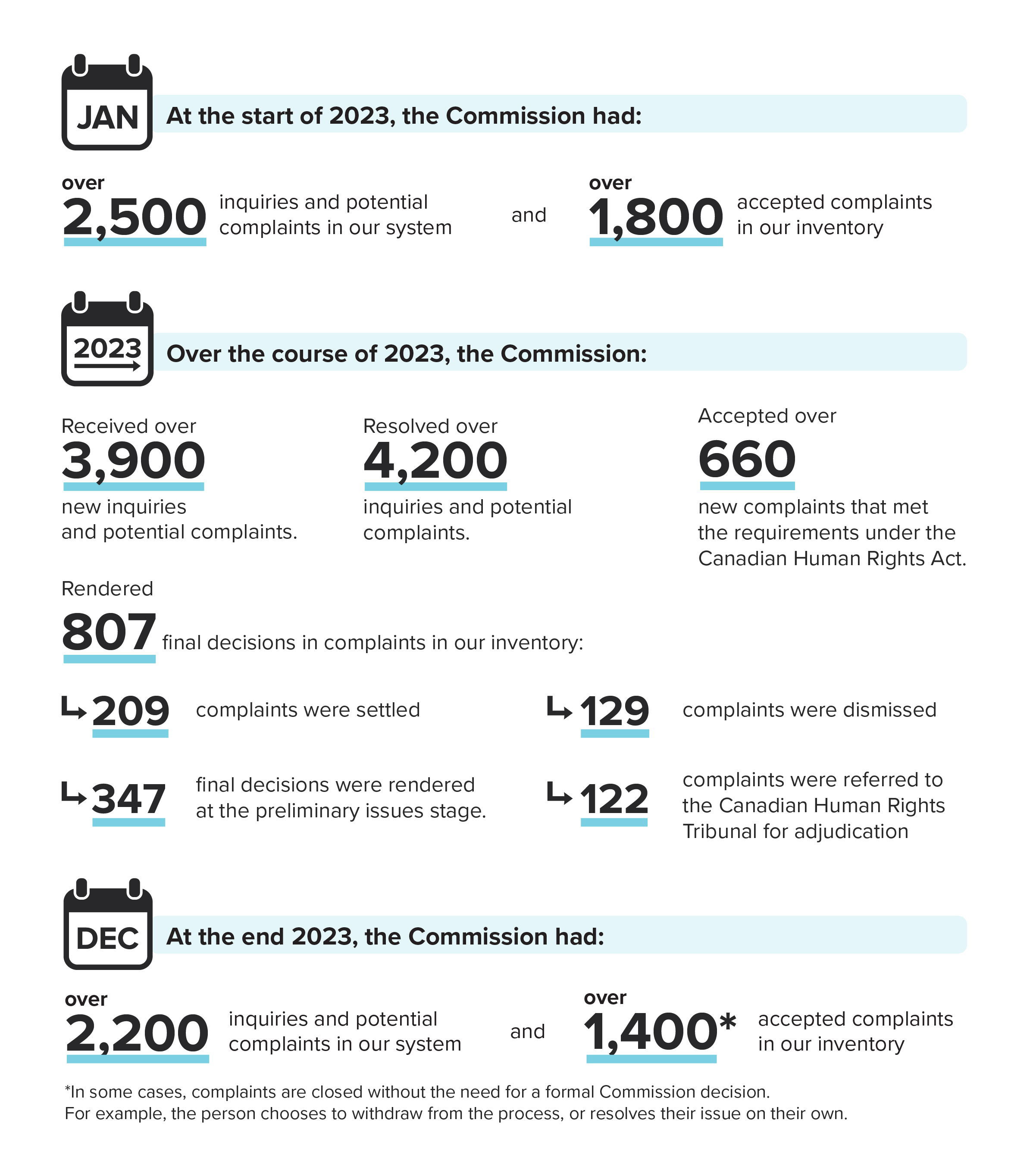
By the numbers: 2023 Complaints Data - Text version
At the start of 2023, the Commission had:
- over 2,500 inquiries and potential complaints in our system
- over 1,800 accepted complaints in our inventory
Over the course of 2023, the Commission:
- Received over 3,900 new inquiries and potential complaints.
- Resolved over 4,200 inquiries and potential complaints.
- Accepted over 660 new complaints that met the requirements under the Canadian Human Rights Act.
Rendered 807 final decisions in complaints in our inventory
- 209 complaints were settled.
- 129 complaints were dismissed.
- 347 final decisions were rendered at the preliminary issues stage.
- 122 complaints were referred to the Canadian Human Rights Tribunal for adjutication.
At the end of 2023, the Commission had:
- over 2,200 inquiries and potential complaints in our system
- over 1,400* accepted complaints in our inventory
*In some cases, complaints are closed without the need for a formal Commission decision.
For example, the person chooses to withdraw from the process, or resolves their issue on their own.
Trends in new complaints

Which grounds were cited in 2023, compared to the past five years?
Proportion of accepted complaints by grounds of discrimination cited:
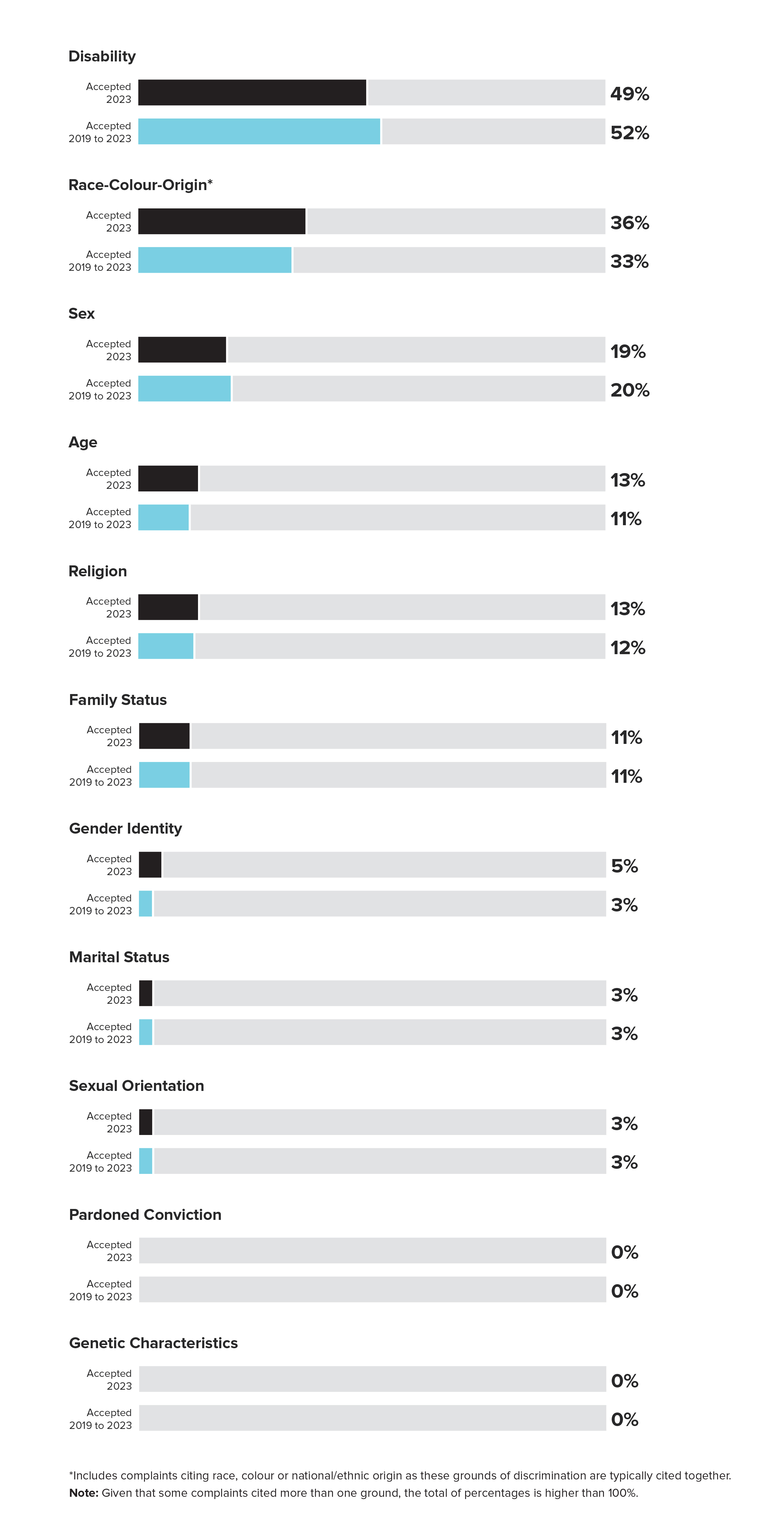
Proportion of accepted complaints by grounds of discrimination cited - Text version
In 2023, the Commission accepted 663 new complaints.
Which grounds were cited in 2023, compared to the past five years?
Proportion of accepted complaints by grounds of discrimination cited:
Disability
Accepted in 2023: 49%
Accepted from 2019 to 2023: 52%
Race-Colour-Origin*
Accepted in 2023: 36%
Accepted from 2019 to 2023: 33%
Sex
Accepted in 2023: 19%
Accepted from 2019 to 2023: 20%
Age
Accepted in 2023: 13%
Accepted from 2019 to 2023: 11%
Religion
Accepted in 2023: 13%
Accepted from 2019 to 2023: 12%
Family Status
Accepted in 2023: 11%
Accepted from 2019 to 2023: 11%
Gender Identity
Accepted in 2023: 5%
Accepted from 2019 to 2023: 3%
Marital Status
Accepted in 2023: 3%
Accepted from 2019 to 2023: 3%
Sexual Orientation
Accepted in 2023: 3%
Accepted from 2019 to 2023: 3%
Pardoned Conviction
Accepted in 2023: 0%
Accepted from 2019 to 2023: 0%
Genetic Characteristics
Accepted in 2023: 0%
Accepted from 2019 to 2023: 0%
Where are the 2023 complaints from?
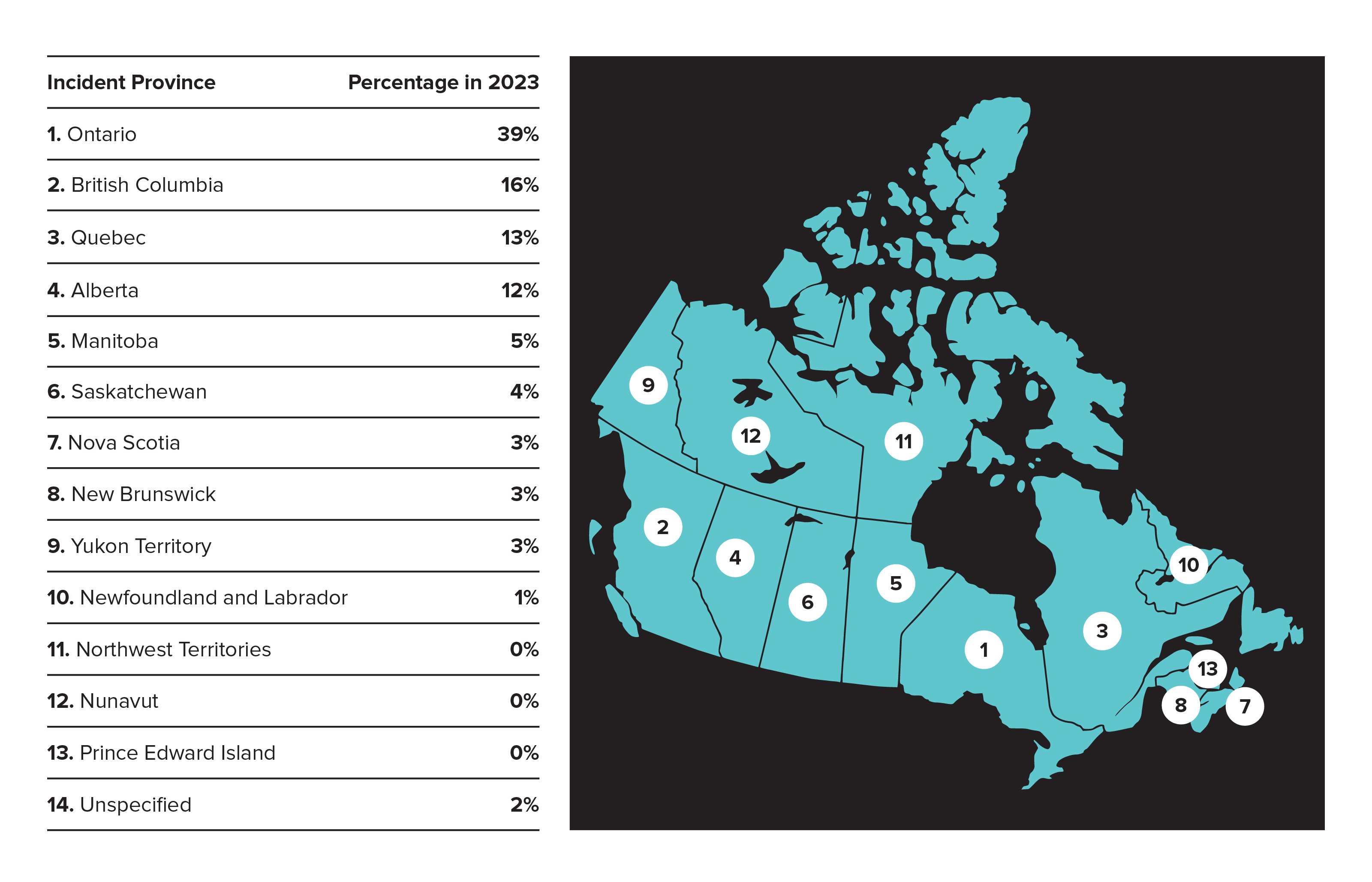
Where are the 2023 complaints from - Text version
Ontario: 39%
British Columbia: 16%
Quebec: 13%
Alberta: 12%
Manitoba: 5%
Saskatchewan: 4%
Nova Scotia: 3%
New Brunswick: 3%
Yukon Territory: 3%
Newfoundland and Labrador: 1%
Northwest Territories: 0%
Nunavu: 0%
Prince Edward Island: 0%
Unspecified: 2%
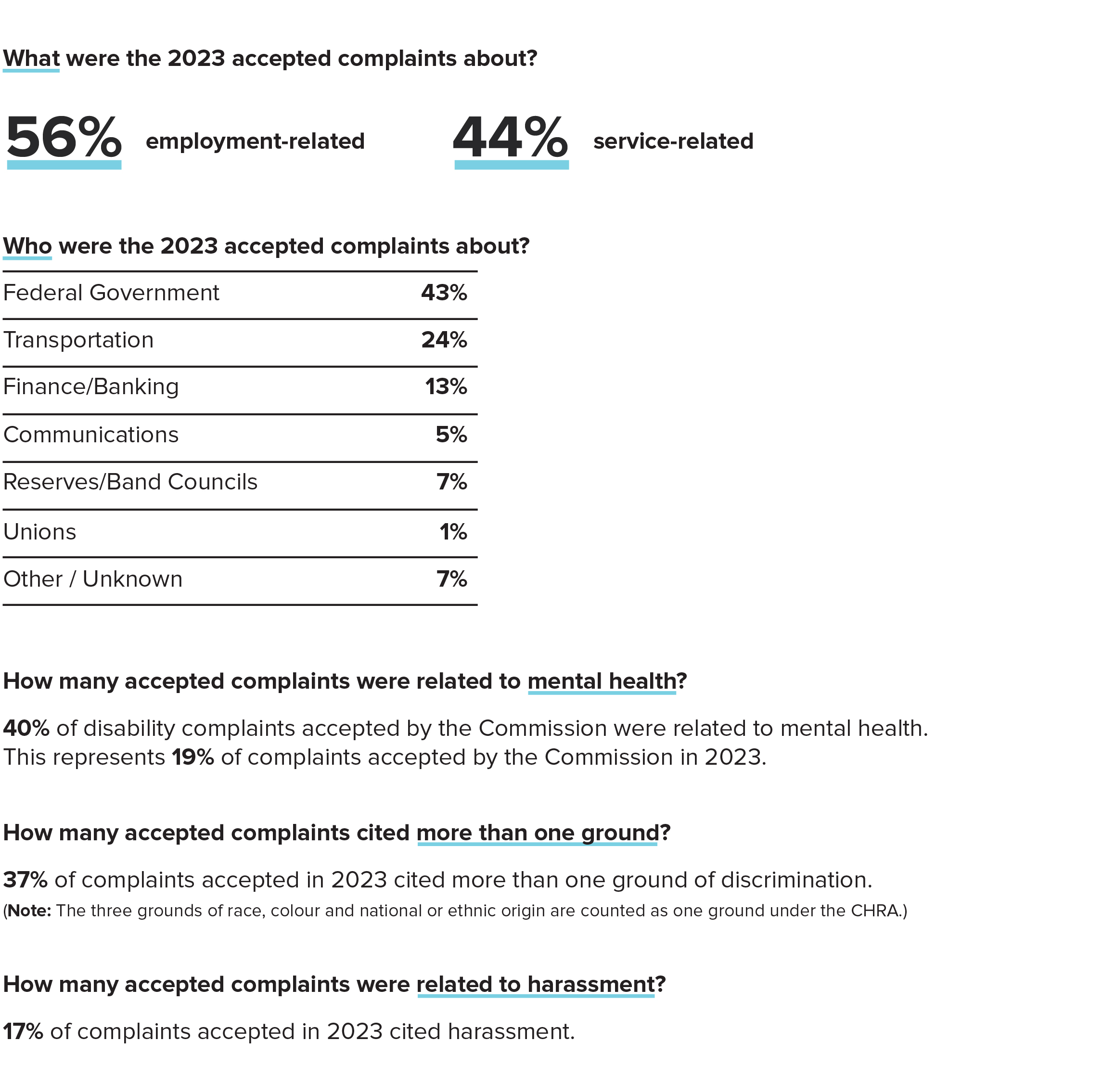
What were the 2023 accepted complaints about? - Text version
What were the 2023 accepted complaints about?
56% employment-related
44% service-related
Who were the 2023 accepted complaints about?
Federal Gouvernment: 43%
Transportation: 24%
Finance / Banking: 13%
Communications: 5%
Reserves / Band Councils: 7%
Unions: 1%
Other / Unknown: 7%
How many accepted complaints were related to mental health?
40% of disability complaints accepted by the Commission were related to mental health.
This represents 19% of complaints accepted by the Commission in 2023.
How many accepted complaints cited more than one ground?
37% of complaints accepted in 2023 cited more than one ground of discrimination.
(Note: The three grounds of race, colour and national or ethnic origin are counted as one ground under the CHRA.)
How many accepted complaints were related to harassment?
17% of complaints accepted in 2023 cited harassment.
Outcome in cases alleging racism
Throughout 2023, we continued to place a particular emphasis on ensuring equitable treatment of all cases citing any of the three grounds of race, colour, or national/ethnic origin (RCNEO), including those citing “anti-black racism” as a key word. The data that follows represents the types of final decisions made by the Commission’s independent Governor in Council-appointed Commissioners, and how the outcomes of RCNEO cases are comparable with all other cases.
Decision in complaints citing Race, Colour, or National or Ethnic Origin
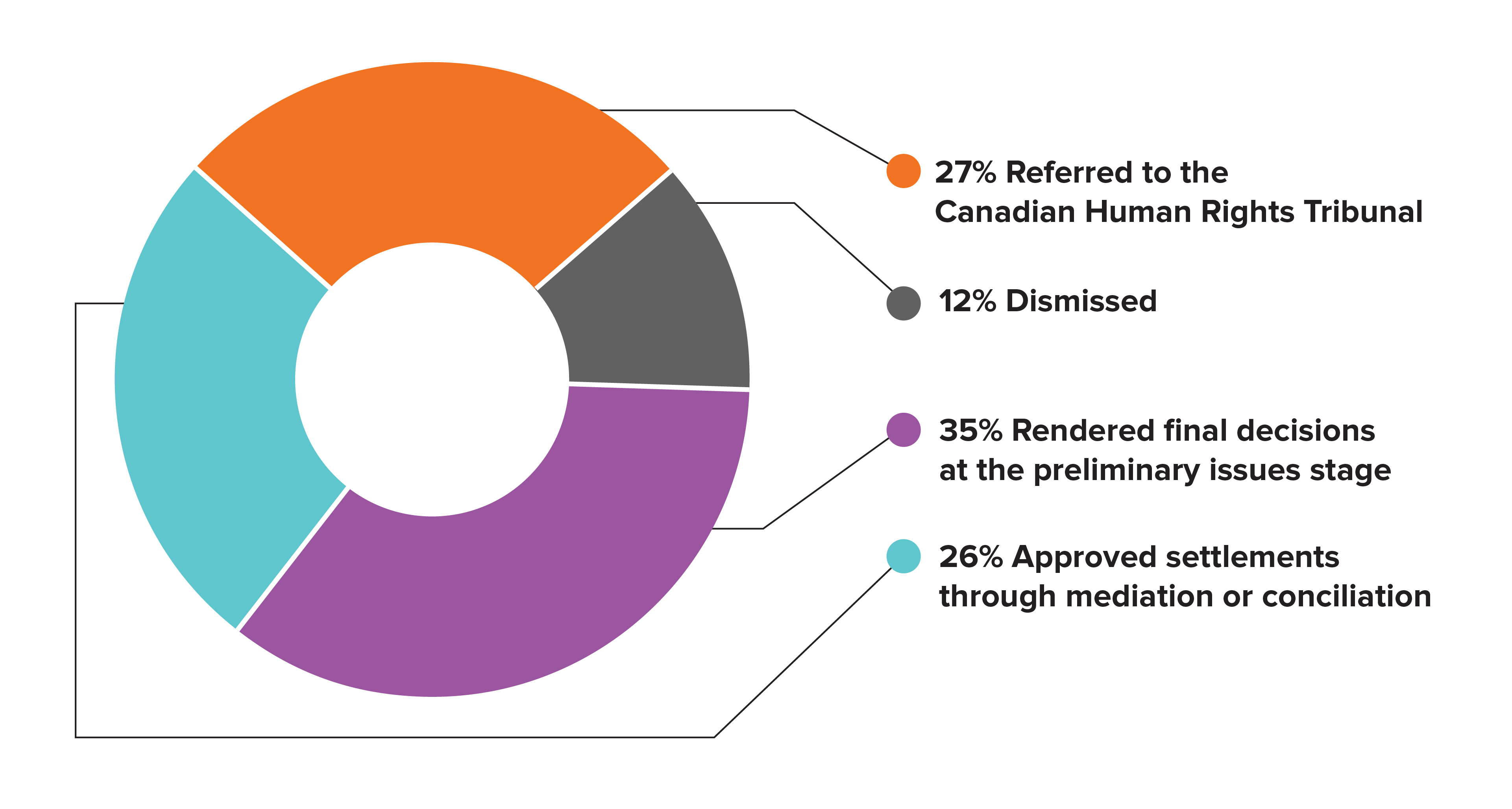
Decision in complaints citing Race, Colour, or National or Ethnic Origin - Text version
Referred to the Canadian Human Rights Tribunal: 27%
Dismissed: 12%
Refered final decisions at the preliminary issues stage: 35%
Approved settlements through mediation or conciliation: 26%
Decision in all complaints
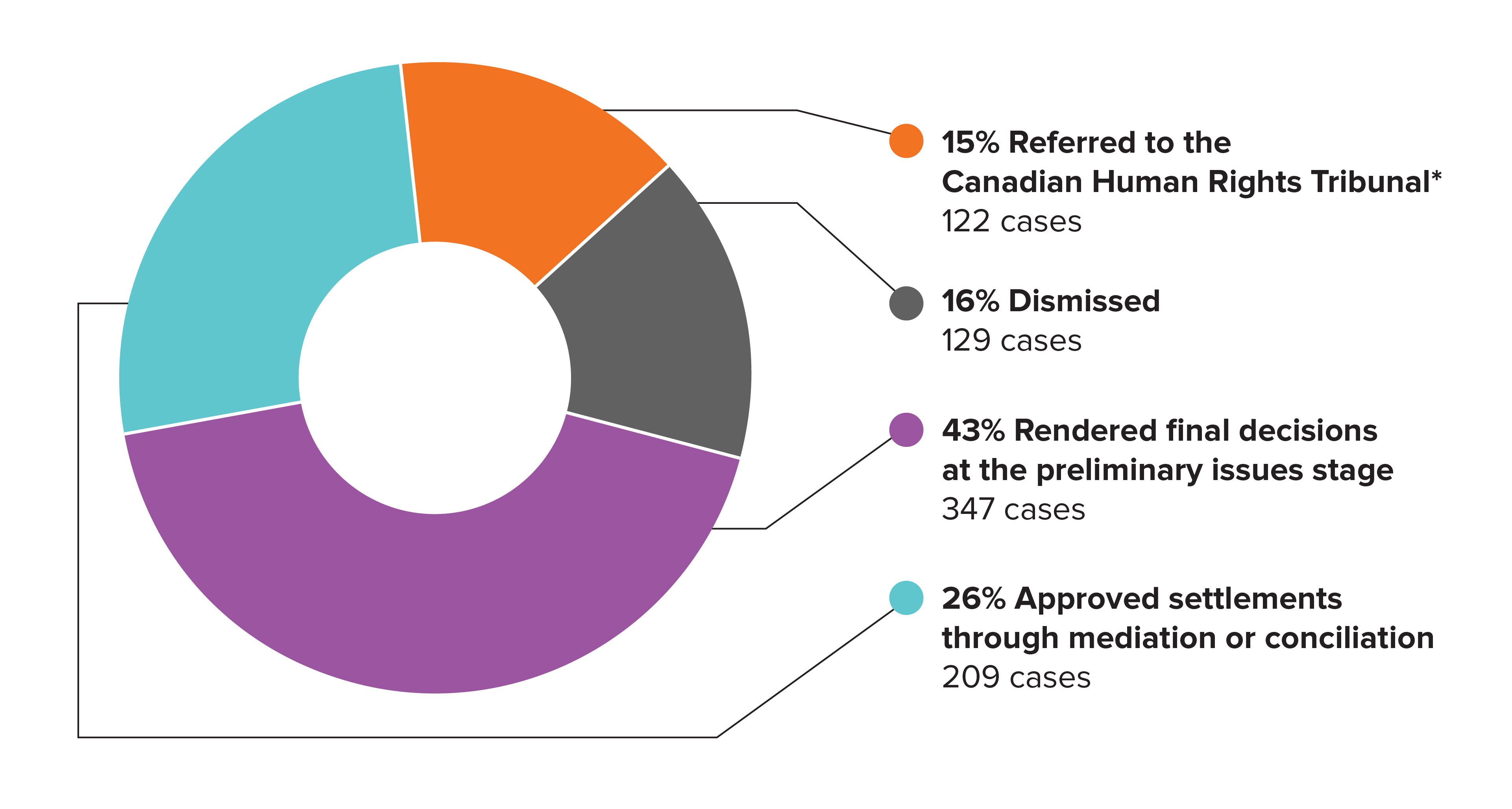
Decision in all complaints - Text version
Referred to the Canadian Human Rights Tribunal*: 15% - 122 cases
Dismissed: 16% - 129 cases
Refered final decisions at the preliminary issues stage: 43% - 347 cases
Approved settlements through mediation or conciliation: 26% - 209 cases
*This includes 56 individual complaints dealing with similar allegations that had been referred to the National Security and Intelligence Review Agency (NSIRA) subsequent to a previous referral to the Tribunal.
Quick terminology: What is an “accepted” complaint?
A complaint is considered accepted for processing if it meets the requirements of the CHRA. The Commission can only accept a complaint that is linked to one or more grounds of discrimination listed in the Canadian Human Rights Act, is within the federal jurisdiction, and is submitted in an acceptable format. More information is available.
Quick terminology: What does it mean to “dismiss” a complaint?
When a complaint is dismissed, it is a decision that one of the independent Commissioners has taken to close a complaint. First, a human rights officer assesses the complaint and prepares a recommendation in the form of a “Report for Decision.” The parties have the opportunity to comment on that Report. Then a Commissioner — in their role as an independent decision-maker — decides that the file does not warrant referral to conciliation, nor further assessment, nor referral to the Tribunal. The complaint file is therefore closed.
The reality of our role as a screening body is that our dismissal rate will never be zero. Dismissing cases is a necessary part of our role as a screening body and part of our role in supporting access to justice. We have a legislated obligation to assess each complaint and close those cases that will not succeed at the Tribunal because they don’t meet the requirements of the law.
Quick terminology: What does it mean to render a decision at the preliminary issues stage?
The Commission makes decisions on preliminary issues after accepting a complaint. Preliminary issues are questions that the Commission may need to resolve under section 40 and/or section 41 of the Canadian Human Rights Act before moving an accepted complaint forward. These issues may include: whether a complaint was filed too late; whether the person filing the complaint is unionized and has access to a grievance process that can deal with the human rights issues; whether the complaint is timely and if not, whether the Commission should nonetheless exercise its limited discretion to deal with it.
Continuing to improve our complaints process
The Commission’s complaint process has come a long way since the Commission first opened its doors over 45 years ago. For decades, our complaints process was solely a paper process. Then in 2017, the Commission launched a new, interactive online complaint form, which has continued to be refined and improved, including a new version launched in 2021.
But even with our step-by-step, user-friendly, online complaint form, the Commission’s complaint process is still a legal process. It can be intimidating. As much as they can, the Commission’s Complaints Services Branch tries to demystify the process and make it as simple and accessible as it can be for everyone. Automated resources like the online complaint form allow the Commission to use its limited resources more effectively. This allows Commission staff to focus their attention on those who need help the most.
In this work, the Complaints Services Branch is guided by the Commission’s internal Accountability Framework, which promotes dismantling barriers in our complaints process for Indigenous, Black, and other racialized complainants. It requires various stages of review by the Commission’s Legal Branch, policy experts, and particularly employees with different lived experiences and diverse backgrounds. All of this furthers the ongoing implementation of the Commission’s Anti-Racism Action Plan — which specifically addresses anti-Black racism — and the Commission’s Accessibility Plan.
Many of the ongoing improvements to the Commission’s complaint process have been informed by feedback received from people with disabilities, and from stakeholders representing Indigenous, Black and other racialized people in Canada. The Commission benefits greatly from these engagements, which ensure that the changes we are making are informed by the experiences of those who use our system.
We are doing all this with the understanding that many of the changes we make in response to the experiences of certain communities often benefit all. For example, changes to improve the way we handle race-based complaints are also improving the way we look at evidence of discrimination based on family status, or complaints related to invisible disabilities.
All this has meant a busy year of continued improvements to the Commission’s complaints process in 2023, within the scope of our budget, and without additional funding. Here are the highlights.
Continuing to improve how the Commission screens, assesses, and resolves complaints
- Simplifying our process so that the way we assess complaints is more efficient, equitable, accessible, and trauma-informed.
- Using our revamped online complaint form to help people explain their complaint in a way that meets the requirements of the CHRA more easily, thereby reducing the number of rewrites that are often required before a complaint can proceed.
- Using simpler procedures to allow us to expedite our decision-making, especially at the preliminary issues stage.
- Using section 49 of the CHRA more frequently to allow us to expedite referrals to the Tribunal and enhance access to justice.
- Providing parties with support to use conciliation or mediation more often to resolve their cases earlier, on their terms, and without needing a hearing.
- Adopting a broad interpretation when assessing whether a complaint meets the necessary criteria under the CHRA.
Taking concrete action to dismantle barriers in the Commission’s complaints process
- Engaging directly with those who use our system through stakeholder meetings with advocates and respondents to update them on how we are making our process more efficient for them, especially in complaints seeking to improve accessibility and address systemic anti-racism — including anti-Black racism.
- Ensuring that the criteria we use to assess raced-based complaints is designed to identify and recognize subtle forms of exclusion or discrimination, and that it is consistently applied.
- Developing training and onboarding tools to ensure complaints staff have the knowledge needed to process files efficiently and equitable. This includes a thorough understanding of the principles of equity, diversity, and inclusion, as well as bias, trauma-informed approaches, and how to recognize subtle acts of exclusion and understand their impact.
- Prioritizing ongoing hiring and retaining of Indigenous, Black and racialized employees with lived experiences of discrimination and racism.
- Continuing the collection and analysis of disaggregated demographic data about who uses the Commission’s complaint process.
Overhauling our complaints data management system
- In 2023, we launched the comprehensive, multi-year design and digital development project to develop a new case management system so that we can better serve people in Canada. We began by engaging internal and external stakeholders in developing business requirements for this massive undertaking. Amongst other benefits, this new system will:
- Facilitate the timely processing of cases.
- Enable us to better track trends to support our advocacy on systemic human rights issues.
- Improve how we collect and retain disaggregated data — especially the collection of key demographic and identity data – about those who use our systems.
 Bringing resolution through mediation & conciliation
Bringing resolution through mediation & conciliation
Access to justice is more than just a day in court. In fact, most complaints the Commission screens are handled without a hearing, through early resolution either in mediation (participation is voluntary) or conciliation (participation is required). The Supreme Court of Canada has made it clear that this is an essential part of the Commission’s role: to help parties find meaningful resolutions efficiently.
Spending years in a court proceeding, like a Tribunal hearing, can be expensive, long, and emotionally taxing. Even in the most seemingly impossible situations, we have seen meaningful results from mediation and conciliation. By coming together and simply talking about what happened and the impact it has had — with no costs and with short timeframes — people are often able to find resolutions that address the harm they experienced and put in place measures to ensure others don’t experience that same harm.
Quick terminology: Mediation is voluntary. When it becomes mandatory, it is called conciliation. Our staff is trained in both.
The Commission’s mediation settlement rate of 61% over the past five years is thanks to the confidential, flexible, trauma-informed and sensitive approach our mediators and conciliators bring to the process. They are mindful of the unique perspectives of all the parties in a complaint: What brought the parties to this point? What do each of them hope to get out of this? What is a win for them? How can we help them get there? And how can we promote human rights in this mediation, and promote systemic remedies in the outcome? These are just some of the important questions our mediators carry with them into each session.
Our mediators — who are also trained conciliators — bring a wealth of expertise in alternative dispute resolution, active listening, and negotiation. They are also well trained to take a trauma-informed approach. They do their best to create an environment of empathy so that everyone feels heard, and feels they have as much time as they need to tell their side of the story.
It is not a court hearing. The parties are free to speak without the painful experience of cross-examination. The idea is to listen and resolve, not to listen and contradict. In our experience, once someone feels they have been truly heard, they can feel free to move forward to resolution. This is why ensuring that people are heard is central to the Commission’s mediation and conciliation services.
 Significant settlements in 2023
Significant settlements in 2023
Each year, the Commission’s mediators and lawyers work to bring resolution in a wide range of discrimination cases, at various stages of the process — in mediation and conciliation at the Commission and in mediations before the Tribunal. Some of them are high profile, with the potential for systemic remedies that will impact the lives of many. Others are more individual, touching only the lives of only the parties involved. Every case matters. Every case is important.
In 2023, our mediation and legal services helped resolve over 200 cases. Most the cases involve stories that never get told or reported publicly, but bear great significance to the lives of the people involved.
In 2023, this included a case involving a Black man who was subjected to racial slurs in his workplace, and another case involving a customer who was required to remove their religious head covering to get service. We helped settle cases where employers failed to properly accommodate employees with disabilities. And we mediated a case involving a trans employee, in the federally regulate private sector, who was misgendered and outed at work. These are just some examples of the average kinds of cases we are helping bring to resolution.
The majority these settlements are confidential. However, in some cases, as part of the settlements, the parties agree to go public.
Systemic change
The following highlights provide a brief look into some of systemic cases that we helped bring to resolution in 2023 and in which the parties agreed to make a public statement.
A race-based complaint against CSIS
This 2023 settlement is the result of a complaint filed by a Black woman who worked for CSIS as an Intelligence Officer. After the Commission referred the complaint to the Tribunal, CSIS, the Complainant and the Commission settled the matter without a Tribunal hearing.
In this settlement, CSIS re-affirms its commitment to:
- promote greater diversity on selection panels, with the goal of including at least one representative from an employment equity group on all panels, to the greatest extent possible;
- run an executive recruitment process for employees from employment equity groups and prioritize the placement of qualified participants into executive roles in areas where representation of the relevant group is lower than workforce availability;
- give employees training on unconscious bias and anti-racism;
- integrate discrimination as an explicit ground for appealing staffing decisions; and
- review HR assessment tools to reduce potential for individual bias and subjectivity.
Read the public statement: CSIS affirms its commitment and actions to address and prevent racism and discrimination in human rights settlement.
A race-based complaint against the RCMP Training Academy
In 2023, the Commission helped the parties in a complaint involving the Royal Canadian Mounted Police (RCMP) reach a human rights settlement aimed at addressing and preventing systemic discrimination at the RCMP Training Academy at Depot Division, in Regina. The case began with a complaint to the Commission from an RCMP cadet, who identified as a Black Canadian, and who attended the RCMP Training Academy.
Thanks to this case, changes are being made right now to address any barriers that underrepresented groups may face when trying to successfully complete their training curriculum at the RCMP Training Academy. Read the public statement: RCMP commits to addressing and preventing discrimination.
A race-based complaint against the National Film Board of Canada
In 2023, the National Film Board of Canada (NFB) reached an agreement to settle a human rights complaint before the Canadian Human Rights Tribunal about systemic discrimination in the workplace. The case began with Mr. Stephen Puskas (who agreed to be named). He is a young Inuk man who had worked at the NFB as an associate producer intern in 2017–2018. He worked on multiple projects, including Hothouse 12 and Ingenia, the NFB's Indigenous Cinema webpage, and helped to promote the NFB and their work in Indigenous communities (i.e. the Wide Awake Tour in Labrador and Kuujjuaq).
With the support of the Center for Research-Action on Race Relations, Mr. Puskas helped bring about powerful changes within the NFB.
Read the public statement: National Film Board of Canada commits to being more inclusive of Inuit culture.
 Spotlight: One year since Arbour Recommendations
Spotlight: One year since Arbour Recommendations
In May 2023, the Commission marked the one year anniversary since Justice Louise Arbour tabled her comprehensive report and recommendations to address sexual misconduct within the ranks the Canadian Armed Forces (CAF).
The issue is more pressing than ever. In December 2023, Statistics Canada released updated data on sexual misconduct in the Canadian Armed Forces. The data confirmed that the percentage of military members who reported being sexually assaulted by another member of the military has more than doubled between 2018 and 2022, with 3.5% of Canadian Armed Forces personnel saying in the survey they were sexually assaulted by another military member in 2022.
Implementation of recommendations 7 and 9 has been a key priority for the Commission this year. These recommendations are meant to ensure that CAF members experiencing sexual harassment or discrimination can choose to bring their complaint directly to the Commission, without restriction, delay or repercussion.
While the Commission has yet to receive any additional resources to support this work, the Commission is already receiving these complaints. We used existing resources in 2023 to support as smooth an implementation as possible.
This work included:
- Putting measures in place to ensure that complaints from CAF members citing sex-based discrimination are ushered through our process as quickly as possible and with a trauma-informed approach.
- Updating the Commission’s online complaint form to make it easier for CAF members to navigate it, and to remove any unintentional barriers that might have automatically referred CAF members to their internal redress process, rather than keeping them within our system.
- Creating a dedicated web presence on the Commission’s website so that CAF members could come to our main page and get the information they need.
- Getting the word out to CAF members across Canada — including on social media and in CAF’s internal newsletter, The Maple Leaf — that they can bring their complaints directly to the Commission knowing that this is a safe place for them to turn.
 Legal Services Branch: 2023 highlights
Legal Services Branch: 2023 highlights
Representing the public interest
The Commission’s Legal Services Branch is a team of lawyers, litigators, paralegals, and legal assistants. The work they do touches every corner of the Commission — from advising Commission colleagues, to helping parties work toward meaningful settlements, to litigating cases and representing the public interest in human rights cases that the Commission refers to the Canadian Human Rights Tribunal.
The Tribunal is an entirely separate organization from the Commission and works like a court — with full hearings where testimony and evidence are presented. Only the Tribunal can decide whether or not discrimination has taken place.
When the Commission decides to represent the public interest in a case before the Tribunal, it means the Legal Services Branch is there to bring the systemic issues in a case to the forefront so that individuals do not have to do it on their own. This happens after the Commission has examined a case, and has recognized that it has the potential to have far-reaching, systemic impacts on the lives of many people, and possibly on how human rights law in Canada is interpreted.
Throughout 2023, the Legal Services Branch participated in legal proceedings before the Tribunal and the federal courts. This included both virtual and in-person Tribunal mediation sessions and hearings. It also included prioritizing the Commission’s full participation in cases alleging race-based discrimination. Key 2023 settlements made possible by both Legal Services Branch and Mediation Services, are highlighted earlier in this report.
In 2023, the Commission referred 122* cases to Tribunal.
Of the cases we referred to the Tribunal in 2023:
- 70% were related to service*
- 39% were related to employment
- 12% involved allegations of harassment
* The 122 cases referred to Tribunal include 56 individual complaints dealing with similar allegations related to the provision of service* that had been referred to the National Security and Intelligence Review Agency (NSIRA) subsequent to a previous referral to the Tribunal.
Note: these figures are not meant to add up to 100%, but to show the various issues involved in the cases, often with overlapping, intersecting issues at play
Participating in a Tribunal case alleging discrimination dating back decades
In 2023, the Commission fully participated in several weeks of a Tribunal hearing dealing with a complaint brought by Cathy Woodgate and 5 other members of the Lake Babine First Nation. They allege that the Royal Canadian Mounted Police (RCMP) discriminated against them by failing to properly investigate their claims of child abuse while they were students in the late 1960s and 1970s.
Advocating for adequate health care for people in prisons with mental disabilities
In 2023, the Commission continued to fully participate in a case that is now before the Tribunal that deals with a complaint brought by the West Coast Prison Justice Society (WCPJS) on behalf of people in prisons with mental disabilities in the custody of Correctional Service Canada (CSC). WCPJS alleges that CSC discriminates against people in prisons with mental disabilities by failing to provide them with adequate care and treatment. The Commission is seeking to change CSC’s policies and practices to ensure people in prisons with mental health disabilities receive the care and treatment they need.
Defending the human rights of federally sentenced women
The Commission also continued to fully participate in a Tribunal matter about allegations that CSC discriminates against federally sentenced women, specifically those who are Indigenous and/or have mental disabilities. In this case, the Canadian Association of Elizabeth Fry Societies alleges that CSC discriminates against federally sentenced women by overclassifying them within the security classification system, holding them in segregated, restricted conditions of confinement and failing to provide and/or properly design, adapt or implement correctional services to meet their needs.
Challenging the Tribunal’s dismissal of a complaint alleging discrimination in processing times for parents' and grandparents' applications for permanent residence
This past year, the Commission brought a judicial review of a Tribunal decision related to delays in processing of parents’ and grandparents’ application for permanent residence. In 2023, the Tribunal dismissed a complaint filed by Amir Attaran alleging that Immigration, Refugees and Citizenship Canada discriminates based on the grounds of race, and national or ethnic origin, age, and family status. He alleged that the total wait time for the processing of parents’ and grandparents’ applications for permanent residence — also comprising the sponsorship application part — was unduly long when compared with wait times for other categories under the family class. The Commission will appear before the Federal Court to argue that the Tribunal’s decision in this case was both procedurally unfair and unreasonable.
Representing the public interest on discriminatory police services in First Nations communities
In 2023, the Federal Court upheld a 2022 Tribunal ruling, that Public Safety Canada discriminated against members of the Pekuakamiulnuatsh First Nation based on race and national or ethnic origin in its implementation of the First Nations Policing Program. The ruling upheld what the Tribunal had found — that the federal government provided inferior policing services to the Pekuakamiulnuatsh First Nation compared with non-First Nations communities.
The Attorney General of Canada has since appealed the decision to the Federal Court of Appeal. The Commission’s Legal Services Branch spent much of 2023 preparing to participate in the appeal, where in early 2024 it will argue that the Federal Court and Tribunal decisions should be upheld.
Key 2023 rulings
Supreme Court ruling: Victory for those who speak out against harmful discourse
In May 2023, the Commission applauded a significant Supreme Court ruling in a human rights case in which the Commission intervened: Hansman v Neufeld. We applauded it as a ruling that affirms people's right to speak out against harmful or discriminatory discourse without fear of being silenced by Strategic Lawsuits Against Public Participation, known as SLAPPs. These lawsuits are sometimes used by individuals or corporations to intimidate and silence public critics by forcing them into lengthy, expensive legal battles.
In October of 2022, the Commission had argued as an intervener before the Supreme Court that the Court should give significant weight to expressions that advance the interests of equity-deserving groups protected under human rights legislation. We said to the Court that people who speak out in support of equity-deserving groups, or who respond to harmful discourse about these groups — within the scope and limits of the law — should be able to do so without fear of lawsuits aimed at silencing them.
Read the public statement: Supreme Court ruling a human rights victory for those who speak out against harmful discourse.
Historic milestone: Landmark human rights case
In October, the Commission welcomed the Federal Court ruling resolving aspects of a years-long legal process that the Commission has been involved in since the initial human rights complaint on behalf of First Nations children and their families.
This ruling means that the Federal Court joins the Canadian Human Rights Tribunal in approving an unprecedented settlement of $23.4 billion dollars for First Nations children, youth and families harmed by Canada’s chronic and discriminatory underfunding of child and family and other services.
This landmark settlement stems from 2007, when the First Nations Child and Family Caring Society of Canada, together with the Assembly of First Nations, filed a human rights complaint against the Government of Canada, on behalf of First Nations children and families. The complaint proceeded before the Canadian Human Rights Tribunal, where the Canadian Human Rights Commission participated on behalf of the public interest.
Now what matters most is to ensure that the settlement is distributed fairly and as swiftly as possible, and that work continues on program reform.
Read the public statement: milestone in landmark human rights case.
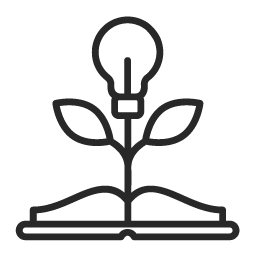 Cultivating human rights knowledge
Cultivating human rights knowledge
The Policy, Research and International Division is a small team of human rights experts, policy advisors, and researchers. They help inform the Commission’s positions on new and emerging human rights issues in Canada. Their human rights expertise informs what the Commission communicates to our public audiences, including: educators, academics, public servants, employers, service providers, members of the media, members of the public, and Parliamentarians.
The Division cultivates their human rights knowledge by conducting and supporting research into emerging human rights issues, and by working closely with advocacy groups, civil society and other human rights experts, in addition to people with lived experience.
Here are a few key highlights from this work in 2023.
National voice for human rights
In 2023, the Commission spoke out on various human rights issues in Canada, including:
- the Canada Disability Benefit Act and the vital importance of financial support to ensuring that everyone can live with dignity and independence.
- the government’s United Nations Declaration Act Action Plan and our support for its commitment to establish an independent Indigenous human rights mechanism for Indigenous peoples.
- the ongoing harms of rising hate and intolerance and of systemic racism – including specifically anti-Black racism.
- the need to enshrine socio-economic rights at the federal level to ensure that everyone living in Canada has equal access to live a life of their choosing.
- the rise we saw over the summer of 2023 of intolerance towards the trans community, and the need to protect the human rights, health, and safety of two-spirit, trans, non-binary, and gender diverse youth in Canada.
- the need for Canada to ensure a safe sporting environment — free from abuse — for all athletes.
- the sharp rise across the country in antisemitism, antisemitic racism, Islamophobia, and anti-Palestinian racism, since October 7, 2023.
Policy advice and engagement
Advice to Parliament
In 2023, the Commission made a number of human rights recommendations to Parliament, including:
- appearing before the Senate Committee of Indigenous Peoples to support the creation of an Indigenous Human Rights Framework;
- highlighting the need to combat Islamophobia and recognize its impacts on Muslims in Canada to the Senate Committee on Human Rights in support of their study of the issue;
- pressing for Canada to ratify OPCAT (the United Nations Optional Protocol to the Convention against Torture and Other Forms of Cruel, Inhuman or Degrading Treatment or Punishment) at the Federal, Provincial and Territorial Human Rights Ministers meetings.
Public Resources
In 2023, the Commission also developed a number of public resources, including:
- Resources on how anti-racism can be implemented by federal departments, agencies and other institutions across Canada:
- A guide called “Anti-Racism & Organizational Change: A Guide for Employers” authored by anti-racism expert Charles C. Smith, and Birgit Rohde, and developed through consultation with the Commission’s Network for Advancing Racial Equality; and
- Two discussion papers on systemic racism and religious intolerance, also developed in consultation with the Network for Advancing Racial Equality.
- A Fast Talk on Environmental Racism with experts, which drew connections between colonialism, societal standards, systems of power, health impacts, the human right to adequate housing, Indigenous knowledge, the legal system, data collection, and climate change. The learning from this Fast Talk is being used to help the Commission plan future work on these issues and to explore options to advocate for human rights impacted by environmental racism in Canada. A summary report from the Fast Talk will be shared on the Commission’s website.
 Holding Canada to its international human rights commitments
Holding Canada to its international human rights commitments
Within the Policy, Research and International Relations Division, there is a smaller team called the International Cooperation and Monitoring Unit. This team is responsible for much of the work the Commission carries out as Canada’s national human rights institution. This work includes:
- Working with the international human rights community — including with United Nations Special Rapporteurs — to promote human rights here at home. For example, in 2023 the Commission met with the UN High Commissioner for Human Rights, Volker Türk, during his visit to Ottawa.
- Compiling submissions to various international human rights bodies each year to help account for how well Canada is upholding its human rights obligations. These submissions raise new and emerging human rights concerns, and draw attention to long-standing inequities.
- Carrying out the Commission’s duties that flow from its official designation as Canada’s National Monitoring Mechanism, which is responsible for monitoring Canada’s implementation of the United Nations Convention on the Rights of Persons with Disabilities. Under this designation, the team highlights concerns related to disability rights throughout all of its work.
This past year was another busy one for the International team, with several key outcomes to highlight. First and foremost, the Commission was re-accredited as an “A-status” institution in 2023 by the Global Alliance of National Human Rights Institutions (GANHRI). This process ensures that national human rights institutions are compliant with the Paris Principles, so that they can continue to be strong, independent and credible bodies committed to the promotion and protection of human rights for all.
As Canada’s A-status national human rights institution, the Commission is responsible for: holding the government to account on ensuring that it fulfills its international human rights obligations at home; monitoring how well Canada is abiding by United Nations human rights treaties; and speaking out where Canada is falling short.
2023 highlights of our international work:
Advocating for the human rights of those deprived of their liberty
In 2023, one of the strategic focuses of the Commission’s international work was to advocate for Canada’s ratification of the United Nations Optional Protocol to the Convention against Torture and Other Forms of Cruel, Inhuman or Degrading Treatment or Punishment (OPCAT). Ratification means that Canada would need to create transparent and independent oversight in all places of detention helping to prevent and reduce the risk of maltreatment.
This has long been a priority issue for the Commission, and we have spoken out for years on issues such as the use of solitary confinement and the rights of migrants in detention. In our work this year, we also emphasized how in ratifying OPCAT, Canada would go further than only improving the human rights of those in federal prisons or in immigration detention. It would also mean improving the human rights of elderly people and people with disabilities living in institutions, such as long-term care residences and nursing homes, as well as children growing up in the child welfare system.
- In 2023, the Commission participated in Canada’s 4th Universal Periodic Review (UPR), which is where Canada’s entire human rights record is reviewed at the UN. In our submission, which garnered national media attention, the Commission emphasized how this issue extends far beyond prisons. We noted how it also affects: people with disabilities institutionalized in facilities inappropriate for their needs; people in long-term care facilities; migrant detainees held in facilities intended for those convicted of crimes; and children — particularly Indigenous and Black children — who are over-represented in the child welfare system.
- Through the work of the International team, the Commission also underscored that having transparent and independent oversight and accountability mechanisms in all places of detention lessens the risk of abuse and ill-treatment, reduces corruption, and restores dignity and human rights for those in the most vulnerable circumstances.
- The Commission participated in the UPR Pre-session for Canada, where we delivered remarks and made two (2) recommendations: 1) that Canada ratify the OPCAT without delay and 2) that Canada ensure that economic, social and cultural rights can be effectively exercised by all people in Canada, including people with disabilities. Both of these recommendations were also taken up by recommending States during Canada’s 4th UPR.
- We provided input on the Kyiv-Copenhagen Declaration (PDF, 116kb), which was adopted at a global conference of NHRIs in 2023. The Declaration sets out a range of practical actions that NHRIs will take as part of their promotion, prevention and protection work on torture and other ill-treatment.
- Finally, together with the Correctional Investigator of Canada, the Commission released a joint open letter to several federal ministers calling for Canada’s urgent ratification of the United Nations Optional Protocol to the Convention against Torture and Other Forms of Cruel, Inhuman or Degrading Treatment or Punishment (OPCAT). As mentioned elsewhere in this Annual Report, the Commission made this issue the key priority in its remarks before the Federal, Provincial and Territorial human rights ministers in 2023.
Raising socio-economic rights and other key issues at the international level
- In 2023, the Commission met with and provided a submission to the UN Special Rapporteur on Contemporary Forms of Slavery as a part of his country visit to Canada. We highlighted a number of key concerns and systemic issues, including: the sexual exploitation of Indigenous peoples; the labour exploitation of migrant workers and people in prisons; the exploitation of people with disabilities; access to housing; and access to justice for victims of exploitation.
- The Commission also met with and provided a submission to the UN Special Rapporteur on the Rights of Indigenous Peoples as a part of his country visit to Canada, in which we highlighted a number of human rights issues pertaining to Indigenous peoples, particularly Indigenous peoples with disabilities. These included: intersecting forms of discrimination and other unique barriers when trying to access basic necessities, supports and services; the lack of accessible and affordable housing options; and concerns regarding the application of accessibility legislation in First Nations communities.
- The Commission also participated in a campaign to help commemorate the 30th anniversary of the Paris Principles and the 75th anniversary of the Universal Declaration of Human Rights, by providing a statement to our regional network of national human rights institutions, also known as RINDHCA, on the importance of ensuring the independence of human rights institutions.
Monitoring the rights of people with disabilities
In addition to highlighting disability rights throughout our international work around OPCAT and socio-economic rights, we also engaged in specific activities in 2023 related to our work as Canada’s National Monitoring Mechanism (NMM). In this role, we are responsible for monitoring Canada’s implementation of the UN Convention on the Rights of Persons with Disabilities. Here are some key 2023 highlights:
- We provided a submission to the Office of the High Commissioner for Human Rights to inform its next thematic report on the study of good practices of support systems to ensure community inclusion of people with disabilities.
- We delivered a statement on behalf of the Global Alliance of National Human Rights Institutions (GANHRI) Working Group on the Rights of Persons with Disabilities at the 16th session of the UN Conference of States Parties to the Convention on the Rights of Persons with Disabilities.
- We released our full plain language public engagement report entitled “What we did and what we learned: Monitoring disability rights,” available in a variety of accessible formats, including sign language videos with closed captioning. This foundational report includes all the rich, detailed data we collected from our 2020 public engagement process to help inform how the Commission monitors the United Nations Convention on the Rights of Persons with Disabilities.
- In partnership with the Office of the Federal Housing Advocate, we continued to engage with experts and people with lived experience on the development of a framework to monitor the right to adequate housing for people with disabilities. The Framework outlines what we know now about the right to housing for people with disabilities, and where the gaps are. More details about the framework are coming in 2024.
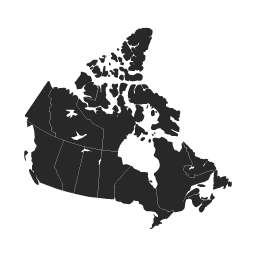 Promoting a barrier-free Canada
Promoting a barrier-free Canada
Employment Equity Division
The work carried out by the Commission’s Employment Equity Division dates back to 1995, when the Commission became responsible for auditing federally regulated employers under the Employment Equity Act (EEA).
In the years that have followed, the Commission has had the responsibility to conduct audits of federally regulated employers to promote compliance with the EEA. The EEA requires federally regulated employers to take steps to eliminate barriers and increase representation in the workplace for members of the four currently designated equity deserving groups: women, Indigenous peoples, racialized people, and people with disabilities.
Over the course of 2023, the team completed individual horizontal audits of several private sector employers in the communications industry as well as federal departments and agencies in the public service. These audits focussed on systemic issues faced by designated group members in each specific sector.
The EE Division completed a pilot blitz audit, in which they examined the self-identification surveys and workforce representation rates of more than 200 small employers. As a result, more employers than ever before have been recently subject to the EEA compliance audits, greatly increasing our impact in enforcing the EEA and in ensuring full representation of members of designated groups.
The team also launched a new horizontal audit on the representation of racialized people in the federally regulated ground transportation sector. This sector is the primary method of freight transportation in Canada with railway and road transportation organizations that cross provincial or international borders, and it is made up of approximately 240 employers with more than 215,000 employees. The objectives of this horizontal audit are to assess compliance with the EEA and share, with employers in that sector, meaningful ways to help them recruit and retain racialized people in their workforces.
On December 11, 2023, the federal government’s Employment Equity Act Review Task Force released its final report, entitled A Transformative Framework to Achieve and Sustain Employment Equity. (PDF).
This report has been in the works since the Taskforce was established in 2021 to compile recommendations to the Minister of Labour on how to modernize and strengthen the Employment Equity Act. Part of their process involved public engagement and consultation, which included the Commission. The Commission provided a submission to the Taskforce in April 2022.
The Commission welcomes the final recommendations in the Taskforce’s 2023 report.
We were pleased in December to see initial commitment from the Government on key items, including:
- creating two new designated groups under the Act: Black people and 2SLGBTQQIA+ people;
- replacing the term “Aboriginal Peoples” with “Indigenous Peoples,” updating the definition to include First Nations, Métis and Inuit, and ensuring it is consistent with the United Nations Declaration on the Rights of Indigenous Peoples Act;
- replacing the term “members of visible minorities” with “racialized people” and updating the corresponding definition; and
- aligning the definition of “persons with disabilities” with the Accessible Canada Act to make it more inclusive.
We look forward to seeing the next steps towards implementation.
Office of the Accessibility Commissioner
The Office of the Accessibility Commissioner is led by Michael Gottheil, Canada’s first Accessibility Commissioner. It consists of a team of dedicated professionals from diverse backgrounds who collectively bring a deep understanding of disability and accessibility gained through personal and professional experiences. Since being established in 2019, the Office has worked with federally regulated organizations to inform them about their legal obligations under the Accessible Canada Act (ACA) and its regulations by providing them with information, guidance and tools.
In 2023, the Office of the Accessibility Commissioner initiated work to promote and enforce compliance with the ACA. They worked with key stakeholders as well as other government partners who are also responsible for implementing the ACA. Together, they identified emerging issues and considered what kinds of guidance and resources federally regulated organizations need in order to create strong and meaningful accessibility plans and consultation processes. The Office also conducted different types of inspections to verify that federally regulated organizations are complying with their regulatory obligations. They developed procedures and tools to make sure they are ready to take enforcement measures where necessary.
The Office of the Accessibility Commissioner has established an information-management infrastructure that includes the My Accessibility Portal. This provides an easier way for federally regulated organizations to notify the Office when they meet their various compliance obligations, such as publishing their accessibility plans.
Commissioner Gottheil’s team has also developed an online tool embedded within our website. It consists of questions designed to guide individuals who are considering filing a complaint under the Accessible Canada Act. Given the Act's distributed accountability across five organizations — the Canadian Human Rights Commission, Canadian Transportation Agency, the Canadian Radio-television and Telecommunications Commission, the Federal Public Sector Labour Relations and Employment Board, and the Accessibility Commissioner — this tool helps users identify the most suitable entity for their complaint.
Throughout 2023, the Office of the Accessibility Commissioner has reached out to regulated entities, members of the disability community, governmental organization, NGOs, and the private sector to maintain the momentum to make Canada fully accessible by 2040, or before. Throughout the past year, the Office of the Accessibility Commissioner has reached out to regulated entities, members of the disability community, governmental organization, NGOs, and the private sector to maintain the momentum to make Canada fully accessible by 2040, or before.
Commissioner Gottheil will provide more detail on this and other key updates in his Annual Report to the Minister of Diversity, Inclusion and Persons with Disabilities.
Office of the Pay Equity Commissioner
Within the Commission, there is also the Office of the Pay Equity Commissioner, which is led by Canada’s Pay Equity Commissioner, Lori Straznicky, since her appointment in November 2022. Since then, the team has made significant strides towards empowering federally regulated entities to close the gender wage gap and fulfill their obligations under the Pay Equity Act (PEA).
In 2023, the team’s hard work was centered on streamlining their services, building their dispute resolution program — with a focus on mediation — and developing their audit strategy and methodologies.
The now launched Pay Equity Portal has been a game changer. The Portal has allowed stakeholders greater access to online materials, it has created a secure environment for the exchange of documents and discussions, and it allows the Pay Equity Unit to be more responsive to questions and requests from the public about pay equity matters.
The team also launched a successful podcast series “Putting Pay Equity into Practice.” It focusses on the road transportation sector in Canada, and the kinds of challenges and opportunities involved in achieving pay equity within this sector.
In 2023, the team partnered with Université Teluq to launch a free online course entitled, “Achieving Pay Equity in Federally Regulated Organizations: Why and How?” The course is available to all, and details everything that employers, employees, bargaining agents and HR professionals would need to know about Pay Equity as a human right, and how to implement it in their workplaces.
Commissioner Straznicky will provide more detail on this and other key updates in her Annual Report to Parliament.
Office of the Federal Housing Advocate
In 2023, the Commission worked with the Federal Housing Advocate, Marie-Josée Houle, to advance the right to adequate housing for everyone in Canada, particularly for people with disabilities. Ms. Houle, and her supporting staff carry out their work from within the Commission, though she is an independent advocate.
The past year saw the housing crisis reach catastrophic proportions in Canada. More people than ever before are facing housing insecurity and homelessness. The pinch of inflation coupled with a severe lack of affordable housing has meant people have given up other basic needs in order to keep a roof over their heads.
Already disadvantaged groups face more barriers to housing — whether because of poverty, discrimination, or a lack of housing options for their needs. This is the case for many people with disabilities. The Commission worked with the Advocate’s office to develop a shared framework for monitoring the right to housing for people with disabilities. It outlines what we know now about the right to housing for people with disabilities, and where the gaps are, and will be made public in 2024.
The Commission and the Advocate also welcomed the launch of Justice Canada’s Action Plan in 2023, which outlines how Canada will implement the United Nations Declaration on the Rights of Indigenous Peoples Act to uphold the human rights of Indigenous peoples. The plan promises an independent human rights process for Indigenous peoples, as well as improved housing rights, policies and programs for First Nations, Inuit and Métis.
The Federal Housing Advocate’s second Annual Report and Recommendations to the Minister of Housing, Infrastructure and Communities is coming soon.